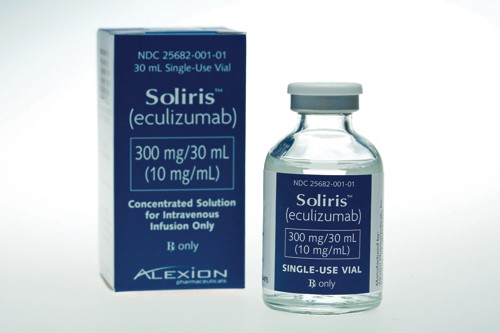
Apellis has new data showing that its pegcetacoplan drug outperformed Alexion’s market leading Soliris in rare disease paroxysmal nocturnal haemoglobinuria (PNH).
The head-to-head PEGASUS study showed that complement C3 inhibitor pegcetacoplan was better than Soliris (eculizumab) at improving haemoglobin levels in adults with PNH, an autoimmune disease characterised by the destruction of red blood cells and anaemia.
Shares in Apellis shot up more than 50% in the wake of the announcement but fell back to close up 28% as investors tried to gauge how well pegcetacoplan would compete with C5 inhibitor Soliris and Alexion’s follow-up Ultomiris (ravulizumab), which brought in $990m and $90m respectively in the third quarter of 2019.
PEGASUS involved 80 adults with PNH who had been on intravenous Soliris and were stable for at least three months with a haemoglobin level of less than 10.5 g/dL at baseline.
Over a four-week period they received twice-weekly subcutaneous doses of pegcetacoplan in addition to Soliris, and were then randomised to either Apellis’ drug or their current Soliris dose for the main treatment phase of the trial.
After 16 weeks, haemoglobin levels in the pegcetacoplan-treated patients had increased by 3.8 g/dL compared to the Soliris group, equating to a 2.4 g/dL rise for the drug as opposed to a 1.5 g/dL decline with Alexion’s drug.
That hit the primary endpoint of the trial and exceeded Apellis’ expectations, said chief executive Cedric Francois, while Evercore ISI analyst Umer Raffat said the data should position pegcetacoplan as the standard of care – at least for Soliris and Ultomiris non-responders.
There was however a mixed picture from the secondary endpoint data. Apellis’ drug did better than Soliris on some measures like allowing patients to avoid blood transfusions, but was unable to prove non-inferiority on the change from baseline in lactate dehydrogenase (LDH) levels – a marker for blood cell damage that is linked to symptom burden.
Alexion was quick to point out that the standard treatment for PNH is shifting from Soliris to Ultomiris, which matched Soliris for efficacy with a trend towards superiority in trials and has improved dosing frequency.
Safety was similar in both arms, but there were more injection site reactions with Apellis’ drug as well as a higher rate of diarrhoea.
Apellis says it is now hoping to meet with the FDA in the first half of this year to discuss the data and next steps on the path to filing for approval.
Much will hinge on whether the FDA will accept a rise in haemoglobin levels as sufficient evidence of clinical benefit on its own, or as is likely will need to see additional outcome data.




